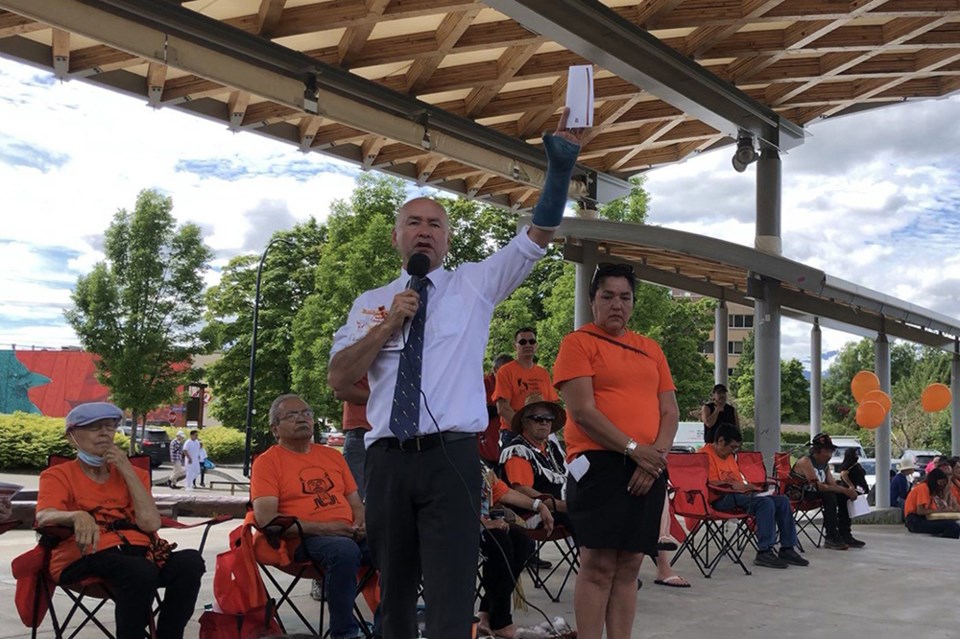Not content with having flipped an NDP seat at the provincial level, Ellis Ross pulled it off again at the federal level on election night when he ousted incumbent Skeena-Bulkley Valley MP Taylor Bachrach.
Ross took the northwestern riding for the Conservatives on election night with 21,202 votes and 47.2 per cent of the vote share.
Skeena-Bulkley Valley encompasses the northwest tip of BC, including communities like Prince Rupert, Terrace, Smithers, Kitimat, Houston, Burns Lake, Fort St. James and Haida Gwaii.
Bachrach, who replaced former MP Nathan Cullen after he moved into provincial politics, received 17,662 votes, 39.3 per cent of ballots cast.
Back in 2017, Ross ousted 12-year NDP MLA Robin Austin in the provincial constituency of Skeena when he was a member of the BC Liberal Party.
“I came from a labourer’s life, just trying to find a full-time job, into the political life in 2003,” Ross said during a May 1 interview with The Citizen.
“It’s very humbling, but it’s also … very hard for my family, especially my mom and dad who are now deceased, to believe that this could happen to a native from a small reserve.”
Ross said he thought the Conservatives’ platform on affordability, drugs and the carbon tax resonated with votes across his riding.
“It’s not just the carbon tax up in my region,” Ross said. “It’s the taxes and the carrier charges on home heating for natural gas. In every remote community, the prices go up because transportation charges actually add to your cost of living as well.”
On drugs, Ross said he didn’t realize the extent of the problem until he started visiting the riding’s remote communities.
Though Conservative Leader Pierre Poilievre lost his seat on election night to Liberal candidate Bruce Fanjoy, Ross said he is backing him to remain in charge of the party.
Ross said he was surprised at the long list of candidates in Poilievre’s former riding of Carleton, in the Ottawa area. The Canadian Press reported that 85 of the 91 candidates in the riding were arranged by The Longest Ballot Committee as a protest to spark a national conversation on electoral reform.
Since the interview, Battle River-Crowfoot Conservative MP-elect Damien Kurek announced his intention to resign to allow Poilievre to vie for the seat in a by-election.
Part of the reason for Ross’ support, he said, is that he thinks the Conservatives under Poilievre align with his people’s views on law and order and drugs.
However, he also said he watched Poilievre in action on the Cable Public Affairs Channel (CPAC) during committee discussions before he became party leader and was impressed with his direct approach.
Dealing with social issues like drugs, Ross said, needs to happen alongside the development of a strong economy.
He said he experienced the negative effects of a downturn economy as a young man in the 80s and 90s and doesn’t want anyone to have to go through that.
During the election campaign, Prime Minister Mark Carney stated that he wants to turn Canada into an energy superpower.
“For the area and for Canada, I want to hold this government accountable for those words,” Ross said. “Because in one province, Carney said that he’d support pipelines. In another province, he said he wouldn’t and then talked about Bill C-69, keeping that in place. A lot of this doesn’t make any sense.”
That bill, passed in 2019, expanded what considerations have to be made before the federal government can issue a certificate for a new pipeline, including environmental factors, safety and security, health, social and economic effects, the interests, concerns and constitutional rights of Indigenous peoples and more.
With that in place, Ross said he doesn’t understand how Canada would become an energy superpower unless the country intends to continue sending all of its exports to the United States.
Since Skeena-Bulkley Valley is home to an in-development private port in Stewart, an inland port in Terrace and other ports in Kitimat and Prince Rupert, Ross said the riding could be a big player in energy exports if it receives government support.
He said he was disappointed that the Liberals have said over the last decade that there’s no business case for liquified natural gas, despite the LNG Canada project in Kitimat and the proposed Cedar LNG and Nisga’a LNG projects in the riding as well as interest from other countries.
Those projects have First Nation involvement and will help those communities realize the potential to meet their treaty rights as well as to secure a future for their people, Ross said.
A lot of the natural gas that will be processed and shipped from Ross’ riding comes from the riding of his Conservative colleague Bob Zimmer, Prince George-Peace River-Northern Rockies. His riding also borders Cariboo-Prince George, represented by Conservative Todd Doherty.
“For years there were two major projects proposed for Kitimat, so as a chief councillor, I went up to Northern BC to take a look at the operation and see where it comes from and meet the people, hoping to make a long term-connection because I felt at the time that our destinies were intertwined,” Ross said of collaborating with his colleagues.
“But there’s also more we want to do as MPs. I know forestry is provincial, but we’ve lost so many forestry job over the last five years and with that, we’ve lost some manufacturing jobs as well. We knew at the Legislature that this is going to cause hardship for workers, families, communities.”
Ross said Canada needs to diversify its forestry exports so that the country isn’t as susceptible to American duties on softwood lumber.


